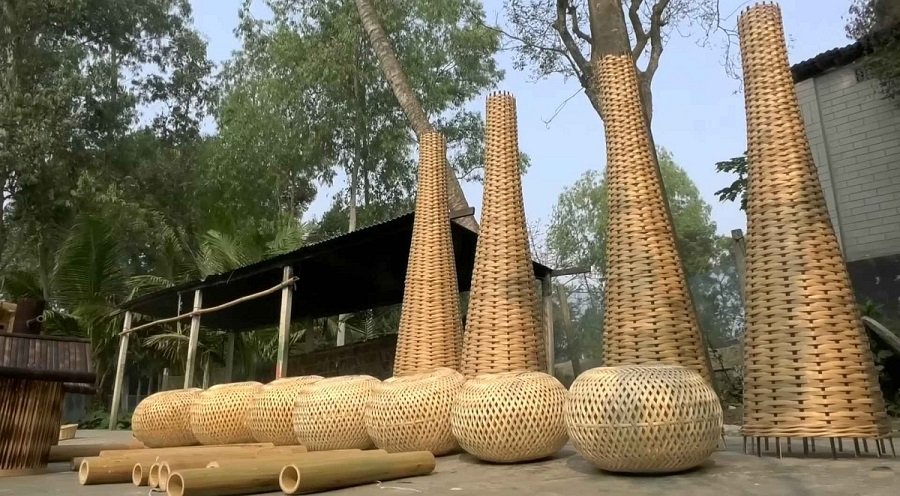Global Market
Like close relatives embracing each other, a vast bamboo grove stands tall, sharing joy and sorrow. Rows of collected bamboo are cut to size and neatly arranged, while a craftsman skillfully trims and smoothens them.
This is Deldur village in Tangail—a paradise of bamboo craftsmanship. The artistry of bamboo and cane has enriched this region, keeping a timeless tradition alive.
In almost every household of Borni, Prayagjani, and Kopakhi villages in the Pubail Union of Deldur Upazila, traditional craftsmanship thrives. Bamboo is sliced into thin strips to create cane, with its thickness adjusted based on the type of craft.
As the primary material in handicrafts and artisan work, cane is carefully crafted by artisans according to their preferences and needs. After being processed from bamboo, the cane is dried in the sun and then colored as required.
In this craft, women are just as skilled as men. This industry has become the primary source of livelihood for most villagers. Through the intricate weaving of cane, the shape of a fruit basket gradually emerges.
Their hands move as smoothly as a machine, shaping each piece with flawless precision. The skilled hands of these artisans transform labor into artistry.
This quiet revolution of handicrafts has reshaped the region. Amidst the lush greenery and tranquil surroundings, a bustling world of craftsmanship thrives.
Sharp blades are used to strip and soften the cane, ensuring flexibility. Pre-made cane strips are then used to secure the edges of the woven baskets.
More than 2,000 people in this region are involved in bamboo-based handicrafts, with many having worked in the industry for over 40 years.
It takes approximately three to four hours to create a single bamboo lampshade. Both men and women here possess remarkable craftsmanship.
These Tangail-made lampshades are not only popular in the local market but are also exported to at least 17 countries. Each factory employs hundreds of workers.
With skilled hands, artisans meticulously carve and weave, shaping exquisite jewelry boxes that showcase intricate craftsmanship.

The intricate craftsmanship and beauty of these handmade pieces can captivate anyone’s heart. Who would have thought that rough, rugged bamboo could be transformed into such elegant shapes?
A bamboo plant takes about three to four years to mature. Only bamboo that is at least three years old is chosen for crafting. Thick-walled, mature bamboo is ideal due to its strength and durability.
The ivory tone of cane, paired with shades of green, brings a natural charm to each product. Jewelry boxes made from this combination are both visually appealing and environmentally friendly.
To remove dust and dirt, the finished products are coated with fine soap powder, rinsed in water, and sun-dried. This process gives the items a clean, polished look while also removing any bamboo odor.
Women in the region skillfully balance their household responsibilities with this craftsmanship. Many earn up to 10,000 BDT per month, contributing significantly to their families.
After washing, items like fruit baskets are spread out under the sun for thorough drying. Different-shaped lamp shades—round, flat, or pumpkin-shaped—add to the colorful drying scene.
Some lamp shades stand out with designs resembling nuclear reactor chimneys. These bold shapes, clustered together, appear as if they’re reaching for the sky—capturing attention effortlessly.
Top artisan and handicraft brands across the country source these bamboo products directly from Tangail. They are sold in local outlets or exported abroad. Before hitting the market, each product undergoes a final check and touch-up at the factory to ensure quality and readiness.

After weaving, glue is applied to each joint, followed by another round of sun-drying. Unwanted rough edges are burned off to smooth the surface. In some cases, fire is used to create artistic burn patterns on the products.
The natural colors of bamboo and cane are often left untouched, requiring just a coat of varnish to highlight their elegance and protect the surface.
In the final stage, electrical components like plugs and holders are added to lamp bases made from blackened, pre-burnt bamboo. This transforms them into fully functional, market-ready products.
A vast collection of handcrafted products can be found here. Currently, there is high demand for baskets, table lamps, lamp shades, place mats, various types of trays, stools, fruit baskets, tissue boxes, pen holders, jewelry boxes, window curtains, waste paper baskets, and many other products, which are commercially produced.
It is hard to imagine the sheer variety of items that can be made from bamboo without seeing them firsthand. The collection of fishing traps and decorative hanging lights is truly remarkable.
Lamp shades resembling an English lady’s hat or home decor inspired by the nests of weaver birds are sure to capture anyone’s admiration.
Many locals independently produce and sell handcrafted products to factories as a family business. A full-time artisan can earn between 17,000 to 20,000 BDT per month.
Some workers, after gaining 6 to 7 years of experience in factories, have taken the initiative to establish their own workshops and have achieved financial success.
Due to the high demand for handicrafts, skilled entrepreneurs have never faced disappointment.
Understanding the tastes and preferences of art-loving customers and developing products accordingly is one of the key secrets behind the success of Tangail’s handicrafts industry.